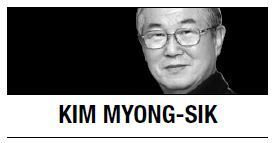Kim Ji-ha is known more for his satirical poems “Five Bandits” and “Rumors” from the 1970s than for the works he produced after he changed his course to something beyond resistance against oppression.
He surprised readers and critics by showing a shift of social views with a 1992 commentary on the death of a student protester. It was published by conservative daily Chosun Ilbo under the title, “Now quit the rituals of death!” Kim then engaged in advocating respect for life in humanity and nature based on Korean indigenous thoughts. His recent writings even advocate certain right-wing political causes.
It was a long time since he chose the five “bandits” as the worst enemies of Korean society for their corruption and abuse of power. They were “chaebol” superrich, National Assemblymen, high-ranking government officials, military generals and Cabinet ministers. The listing of top power elite for harsh ridicule and condemnation so infuriated authorities that the poet was promptly jailed and earned international fame as a dissident poet.
Whatever happened to Kim Ji-ha in recent years, he is still the author of “Five Bandits” in my personal register, and many others’ perhaps. It was a great shock to read the long piece packed with acrimonious, vulgar words arranged in Korean traditional rhymes in monthly magazine Sasanggye (World of Thoughts). Then the long manuscript of “Rumors” was smuggled out of prison to be published by a Catholic magazine, which was subsequently closed down.
As I recall the 1970s poem in 2016, the short list of the enemies of the republic seems to need an updating, but the original members of the disgraceful club are still very much under social scorn. Chaebol owners and their families are despised for being stingy in new investments, but generous in intramural transactions; high-ranking officials and Cabinet members for toadyism; and military commanders for inertia and corruption, if commendable for their departure from politics.
Never conceding the top place over the passage of time are lawmakers, who Kim Ji-ha loathed for cheating the people with unfulfilled promises and offering flattery to power holders with their “split tongues of snakes.” Yet, there is one notable change in the superstructure of Korean society. If Kim is to write a sequel to Five Bandits, he will surely add the legal professionals, namely judges, prosecutors and lawyers, as the sixth condemnable group.
In recent months, newspaper readers have had difficulty in telling who did what in the deluge of scandals involving present and former judges and prosecutors as well as lawyers who are retired judges or prosecutors. There is Choi Yu-jeong, Hong Man-pyo, Jin Gyung-joon, Kim Hyung-jun, Woo Byung-woo and a senior judge Im who the media have yet to identify in full because charges are still being worked out.
I miss the raw satire Kim Ji-ha might apply to the improprieties in which these elite legal professionals are implicated. As the oppressive 70s fired up poet Kim’s valor and literary genius to vent the anger of the times against the upper-level corruption and hypocrisy, he should deplore that the freer 21st century Korea has turned the whole society impassive and even tolerant to common evils.
The nation enjoys far greater civil liberty and affluence and more extensive media networks then the days when Kim Ji-ha lived as a die-hard dissident. The number of lawyers grew from about 1,000 in the entire nation to well above 20,000 in the past four decades. Competition is tough in the area of legal service naturally, and then we are puzzled why competition leads not to a clean and fair environment, but to a murkier market.
We can extend the list of evildoers by identifying new varieties of “Bandits”: radical unionists undermining labor peace, crooked arms dealers and their uniformed cronies who collude to provide low performance fighting equipment, university professors spending more time in golf courses than in their labs, businessmen squandering slush funds in overseas gambling.
But any one kind in the above catalogue cannot be compared with bad legal professionals in doing harm to national health. The time-honored dictum of “guilty without money, not guilty with money” continues to hold true as long as the brightest judges and prosecutors meet lawyers and brokers on a daily basis in lush country clubs and plush bars.
With stories of retired Supreme Court justices making billions of won within a year or two of starting a legal practice circulating in the corridors of Seocho-dong courthouses, it is natural the sharp brains of young judges and prosecutors are stained by longings for wealth and drained of sense of justice. The Jung Un-ho scandal, which was exposed because of the cosmetics tycoon’s assault on his ex-senior judge attorney, helped us imagine the immense undersea part of the huge iceberg of corruption in legal affairs.
Why is it like this? To this troubling question, sociologist Song Bok, one of today’s voices of conscience, tried to offer an answer in a recent interview. He concluded that these aberrant behaviors by the elite legal professionals come down to one problem. They consider the power and glory of their job to be entirely the reward for their individual toils of entering top-rated universities and passing the needle’s eye state examination, they believe they owe nothing to society or the nation, hence no room for “noblesse oblige.”
Accepting his opinion, we might add one other cause, a sort of extenuating circumstances. There is a sea of willing public to offer anything to win their suits or just to avoid going behind bars. Korea has a most-connected society with the most litigious people in the world. The result is money invincible and justice abandoned.
By Kim Myong-sik
Kim Myong-sik is a former editorial writer for The Korea Herald. He can be reached at
kmyongsik@hanmail.net – Ed.







![[Weekender] Korea's traditional sauce culture gains global recognition](http://res.heraldm.com/phpwas/restmb_idxmake.php?idx=644&simg=/content/image/2024/11/21/20241121050153_0.jpg)
